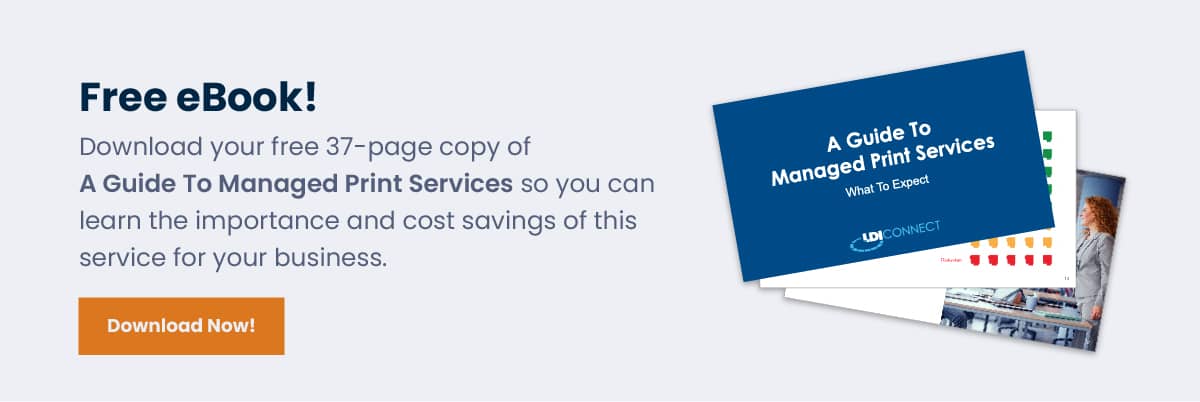3 Ways Managed Print Can Reduce Healthcare Costs
Healthcare | Managed Print | Print
According to recent findings from a Software Advice survey, 44 percent of healthcare providers are still using paper records.
Healthcare providers and facilities still use faxing to send medical information, patient charts, and patient records.
All that faxing correlates with a surplus of printed pages and printer equipment. Which, in turn, makes managed print services in healthcare essential.
LDI Connect’s managed print team works with prospects and clients in all industries to help optimize their print environment and find print solutions that meet their print needs.
We have seen how MPS can benefit healthcare organizations by saving money on paper, enhancing efficiency, and optimizing data security.
This article will review the three ways MPS can help healthcare reduce print costs. By the end of this article, you’ll understand how better printing can help your healthcare facility save costs, improve efficiency, and improve data confidentiality.
How Can MPS Help Healthcare Reduce Costs?
Managed print services can play a vital role in a healthcare organization’s productivity, cost savings, and flexibility.
But how exactly can managed print services help healthcare organizations save money?
Let’s explore three ways MPS can help reduce costs.
1. Improves Print Workflow
Experts will analyze your print environment at the beginning of any partnership with an MPS provider. Why?
Managed print providers provide print assessments to understand a client’s particular print infrastructure fully.
A print assessment includes evaluating the devices within a client’s inventory. This also includes understanding the security risks, print activity, and associated costs with each device.
Your healthcare organization’s needs and goals are unique. With managed print services, a team of specialists will learn about your print environment inside and out.
This way, they can help you improve document workflows, cut out wasteful processes and enforce better print security. You may be asking, “but how does this reduce costs exactly?”
Good question! By assessing your environment, the MPS provider can compile a list of outdated devices, print activity per device (details the current cost per page (CPP), the security risks per device.
Once this information is compiled and presented, an MPS provider can recommend cost-saving solutions.
For example, suppose the MPS provider assesses your environment and finds that your organization has over twenty multifunction devices (MFDs). But, only five are used.
In that case, an MPS provider may advise relocating under-utilized devices to the high-traffic area. Another option may be downsizing to stop leasing or paying for under-utilized devices.
Managed print providers take a consultative approach in recommending suitable print solutions.
An assessment is the first step in assessing where money is going in your print environment.
You may never know where your money is going if you never receive an assessment. Plus, reviews help clients take a step back to realize which device needs replacing because of how outdated it is and how to optimize their print environment.
2. Provides Document Management Software Options
With HIPPA laws and regulations, secure data sharing is essential for the healthcare industry.
MPS offers protection of confidential records and information by helping protect a patient’s right to privacy. How?
Well, it all comes down to installing the right software on each printing device. Secure printing software such as uniFLOW and PaperCut allows organizations to protect patient information.
For example, suppose a healthcare administrator prints a document from their computer. The office printer or MFP will hold the data for that print job in a queue and won’t print that document until that employee manually enters or swipes an ID to release the job.
This process ensures that printed confidential documents don’t end up in the wrong hands and also ensures that your healthcare organization won’t be fined for not being HIPPA compliant.
Also, secure printing software enables organizations to be more waste-conscious by offering setting options that prompt the user not to print in color. An MSP provider can help implement this software and offer training to get the most out of it to help you reduce paper waste and unnecessary print costs.
3. Stops Print Consumable Waste
Ordering the wrong print consumables like ink or toner, for your printing devices can drive up costs when it’s a consistent issue.
Managed print services can help by actively monitoring your devices and setting up an auto-supply replenishment. You can think of auto-supply replenishment as the automatic ordering and replenishment of the supplies your devices need to run smoothly.
Once your printing devices read that they are low on ink or toner, the correct supplies for that brand of the device will be re-ordered and charged to your account.
So no more over-ordering or accidentally ordering the wrong supplies per device. This process can take the weight off of overburdened healthcare administrators and providers who have enough on their plate as it is.
Managed print services can make printing practices more efficient and cost-friendly.
Is Your Business Ready To Work With A Managed Print Provider?
If your healthcare organization realizes it wants to reduce its print costs, that’s already half the battle.
Inefficient print workflows and print costs can be difficult to notice because losses may be short-term. Yet, these setbacks can add up if your organization is waiting an extra minute at the printer to wait for a document to print or can’t figure out how to decipher the print setting.
Managed print services can offer a long-term solution by reducing printing costs and optimizing efficiency.
To learn more about MPS costs and how LDI Connect can help, read are on how LDI Connect can help customers with their print costs.
